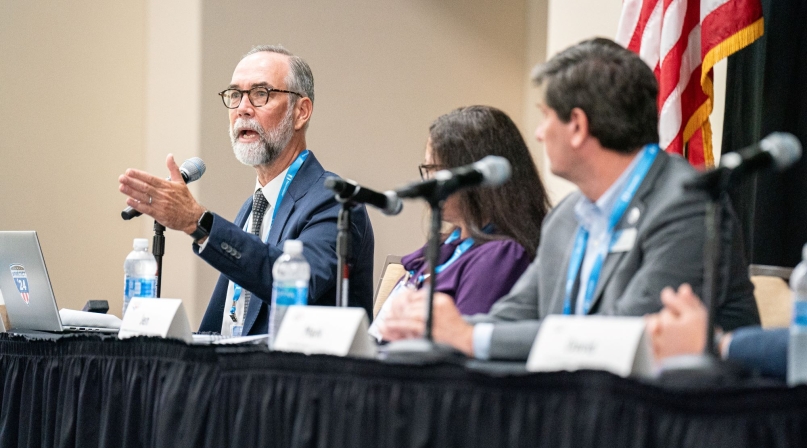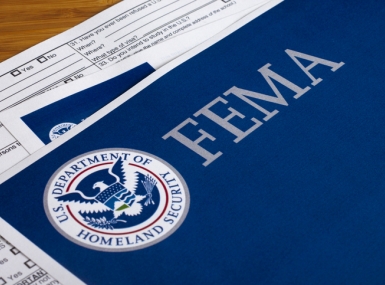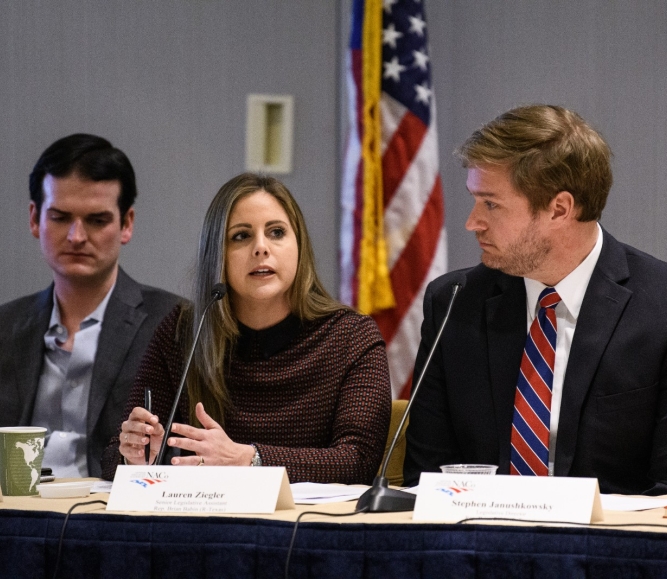CISA offers tools to protect you and your county

Key Takeaways
Disinformation campaigns by foreign adversary bots, rumors flying on neighborhood message boards, increasingly partisan politics all play a part in making for a more unsafe world for county officials.
During a panel discussion July 13, NACo members heard harrowing stories about threats of violence against county officials, how it impacts their lives and solutions they can take to protect themselves, their families and co-workers.
“I don’t think we ever had a panel exactly like this before, but because of what we’ve seen in the last few years — there have been tremendous changes and threats made against public officials — we have to have these panels now,” said Erie County, N.Y. Executive Mark Poloncarz, now in his fourth term.
He began getting “not so nice comments and threats” during the COVID pandemic and then it eventually escalated to “threats against my life,” Poloncarz said. Individuals showed up with weapons at his office, protested in front of his home and loudly knocked on his door late at night.
For about two years, Poloncarz was under the sheriff’s office dignitary protection. “Some people think it sounds great, ‘You’ve got drivers! They take you everywhere you want!’ It’s not great. Your entire daily routine is completely tossed out the window.”
Poloncarz boiled down his advice to: “What I would put out to you — you cannot take anything lightly. It doesn’t matter if it’s a phone call, an email, a one-on-one conversation that gets heated. You don’t know the state of mind of that individual.”
Fellow panelist Jen Marson, executive director of the Arizona Association of Counties and Arizona Sheriffs’ Association, said her experience has been “a little bit different” than Poloncarz's, due to her position, but nonetheless challenging.
Her life has been turned upside down, she said, due to her position, often finding herself testifying “40 times a week” as “the legislative face of elections in Arizona. I’m the one who testifies on all of the bills related to elections, usually in opposition…”
At the association for 22 years, she noted that “this is very personal. I consider these people [members of the association] to be members of my family. It impacts your staff. For us, this started in 2016. I was called to come and testify right after a very contentious election. We’re seated in the front row and there are literally people throwing things at our heads. Nobody stopped it. Nobody on the dais said, ‘Hey, knock it off.’ And the things said to us were horrible things.”
The situation “ramped up,” in 2020, she said, when a rural county recorder’s pets were poisoned on her property. “We’ve had so much turnover in election directors and recorders in our state because this is too much.”
Since November 2020, 55% of Arizona’s chief local election officials are new. In four of the six largest counties, both the elections director and county recorder are new since that time.
Marson said she “knew it was out of control in Arizona” when she was threatened. “So, when I got the email, and then the voicemail and the letter left at the office, that said ‘Hey, we see you walking to work, it would be a shame if my car went off the road and hit you one of these days,’ for me, that became very real. So now I drive to the Capitol.”
Her advice to anyone facing similar harassment is to keep a record of any threats, “even if it’s a note on your phone. Just keep a record. That would be one of my recommendations.”
“I’ve heard some people say, ‘I’m not going to let them win, I’m not going to change my routine.” But she tells her members, “‘Please let it disrupt your life.’ That pride is not worth your life. If that means you take a different route to work, tell a supervisor, get some counseling, to me, that’s worth it. That’s the message I would share with you today.”
Former elections administrator, David Stafford, now the Region 4 Election Security advisor at the federal Cybersecurity and Infrastructure Agency (CISA), said working in county elections has always been difficult, but “then you add this layer on top of that, you run the risk of people being upset with you.”
CISA is a resource offering products and services such as assessments and training exercises to counties and others. CISA’s protective security advisors, usually former military or law enforcement, offer free safety assessments. “They are looking at physical space,” Stafford said. “We deliver confidential assessments back to the stakeholder, what you’re doing right and what needs to be improved.”
The assessments include a series of recommendations, identifying no-cost and low-cost solutions.
Stafford also recommends checking out the #Protect2024 page on the CISA website. “It’s really, really good,” he said. “We have buckets of things that will protect your office, website and emails.”
Related News

States file lawsuit challenging FEMA’s new rules on emergency management grants
On November 4, a coalition of 12 states filed a lawsuit against the U.S. Department of Homeland Security (DHS) and the Federal Emergency Management Agency (FEMA), alleging that recent changes to key emergency management grants are unlawful and could disrupt state and local preparedness efforts.

County Countdown – Nov. 4, 2025
Every other week, NACo's County Countdown reviews top federal policy advocacy items with an eye towards counties and the intergovernmental partnership.
FEMA bill staffers offer insights into reform effort
NACo Intergovernmental Disaster Reform Task Force heard from staffers who helped shape a bill that would make dramatic changes to the Federal Emergency Management Agency.
County News
Proposed legislation to stop mass shootings calls for identifying behavioral threats

